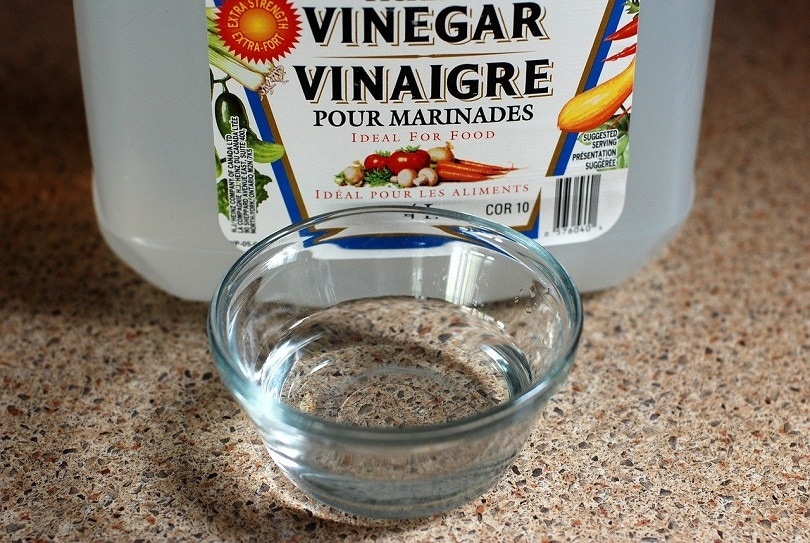
Cats are curious creatures, which means they will go anywhere and everywhere in your home and get into anything that catches their fancy. Sometimes it’s not a big deal, like if your favorite feline has decided the sink is its favorite napping spot. But other times, the things cats can choose to play with are not great for them (such as toxic plants) or are simply items you’d rather they didn’t get their paws on.
But how can you deter your cat from areas and items it shouldn’t be around? One way to discourage them is by taking advantage of their keen sense of smell. That’s what makes vinegar a great homemade remedy to keep cats away! The scent keeps cats from where they shouldn’t be, but it’s also safe to use around your four-legged friends. That vinegar odor might not deter all cats, though, as every feline is different, but the majority should want to avoid it at all costs.
How to Use Vinegar to Keep Cats Away
Though you can use only vinegar in places you want to keep cats away from, it’s recommended that you use a diluted mixture instead. Some items or plants might be harmed by pure vinegar, so simply dilute the vinegar with some water to keep your things in mint condition. You might have to experiment a bit to see what ratio of vinegar to water will deter your kitty and have no effect on your personal items, though. The maximum concentration should be 50% vinegar and 50% water, but we recommend starting with less vinegar.
When you’re ready to use your vinegar mix, there are a few ways you can do so.

1. Indoor Spraying
You can use the diluted vinegar mix indoors to keep your cats away from pretty much anything; just ensure you’re using the lowest concentration you can so it won’t harm either the cat or your stuff. (Plus, you probably dislike the smell of vinegar almost as much as your pet, so making your whole home reek of it likely won’t make it worth using it as a deterrent!).
When you have your mixture, put it in a spray bottle and just spray the surfaces wherever you want the kitty to stop hanging out. Do this every day until your pet gets the hint and moves on to somewhere else. After that, you can continue using it to prevent your cat from exploring any new areas it shouldn’t.
2. Outdoor Spraying
Maybe your cat spends a lot of time outdoors, or you just have neighborhood cats lazing about your yard that you’d like to run off. Vinegar is helpful here, as well. A very diluted mixture is recommended here, too, since vinegar can kill plants. You’ll have to do a bit of testing with the diluted mixture here to find a ratio that won’t turn leaves brown or kill your greenery, but it shouldn’t take long to find the right mix.
And just as you would indoors, spray that vinegar-water concentrate around wherever you want to repel felines. Spray outdoors every other day (unless it rains or an area has been watered, then spray after the location is dry again) until your cat or the neighborhood cats have stopped going where they shouldn’t.

3. Soaking
Soaking is your best bet if spraying isn’t quite getting the job done. That doesn’t mean soaking the item or area itself! Rather you’ll want to soak a rag, washcloth, or sponge in vinegar and put it in the area you’re trying to keep cats away from. And putting this soaked sponge or rag into a small container can help keep the vinegar from drying too fast. Soaking can be used indoors and outdoors; just resoak the rag when it loses its vinegary smell.
Other Scents That Deter Felines
Maybe the smell of vinegar makes you feel ill, or it’s not working on your cat for some reason. In that case, there are other scents you can try. Below are just a few:

 Final Thoughts
Final Thoughts
If you’d like to keep your cat out of specific places and away from certain things, you can absolutely use vinegar to do so. Simply dilute a bit of vinegar with water and either spray around what should be avoided or leave a soaked rag in the area. This should work for most cats (though all cats are different, and some might not mind the smell as much). If vinegar fails, you can try another scent felines dislike, such as citrus, banana, coffee, or spicy peppers. Over time, the cat should learn to avoid places that smell displeasing!
See also:
Featured Image Credit: focal point, Shutterstock







